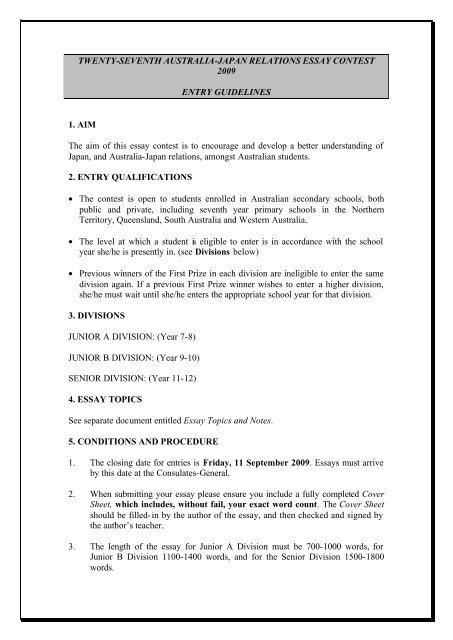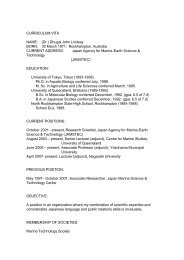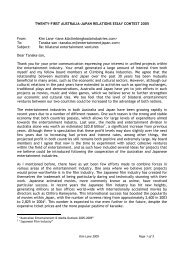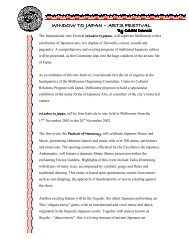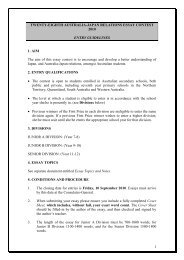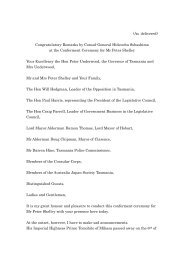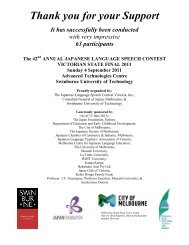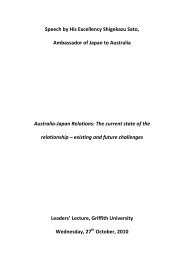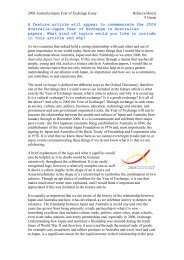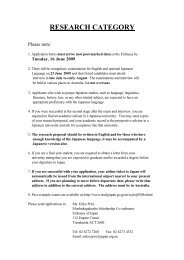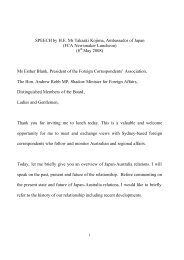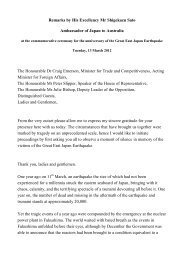TWENTY-SEVENTH AUSTRALIA-JAPAN RELATIONS ESSAY ...
TWENTY-SEVENTH AUSTRALIA-JAPAN RELATIONS ESSAY ...
TWENTY-SEVENTH AUSTRALIA-JAPAN RELATIONS ESSAY ...
Create successful ePaper yourself
Turn your PDF publications into a flip-book with our unique Google optimized e-Paper software.
<strong>TWENTY</strong>-<strong>SEVENTH</strong> <strong>AUSTRALIA</strong>-<strong>JAPAN</strong> <strong>RELATIONS</strong> <strong>ESSAY</strong> CONTEST<br />
2009<br />
ENTRY GUIDELINES<br />
1. AIM<br />
The aim of this essay contest is to encourage and develop a better understanding of<br />
Japan, and Australia-Japan relations, amongst Australian students.<br />
2. ENTRY QUALIFICATIONS<br />
• The contest is open to students enrolled in Australian secondary schools, both<br />
public and private, including seventh year primary schools in the Northern<br />
Territory, Queensland, South Australia and Western Australia.<br />
• The level at which a student is eligible to enter is in accordance with the school<br />
year she/he is presently in. (see Divisions below)<br />
• Previous winners of the First Prize in each division are ineligible to enter the same<br />
division again. If a previous First Prize winner wishes to enter a higher division,<br />
she/he must wait until she/he enters the appropriate school year for that division.<br />
3. DIVISIONS<br />
JUNIOR A DIVISION: (Year 7-8)<br />
JUNIOR B DIVISION: (Year 9-10)<br />
SENIOR DIVISION: (Year 11-12)<br />
4. <strong>ESSAY</strong> TOPICS<br />
See separate document entitled Essay Topics and Notes.<br />
5. CONDITIONS AND PROCEDURE<br />
1. The closing date for entries is Friday, 11 September 2009. Essays must arrive<br />
by this date at the Consulates-General.<br />
2. When submitting your essay please ensure you include a fully completed Cover<br />
Sheet, which includes, without fail, your exact word count. The Cover Sheet<br />
should be filled-in by the author of the essay, and then checked and signed by<br />
the author’s teacher.<br />
3. The length of the essay for Junior A Division must be 700-1000 words, for<br />
Junior B Division 1100-1400 words, and for the Senior Division 1500-1800<br />
words.
4. The essay should be submitted on A4 paper, preferably typed (or written in<br />
block letters), in at least a 12-point sized font. Please keep a copy of the essay<br />
for your own records.<br />
5. Essays must be written in English.<br />
6. Essays must conform to the word limit as specified above and include a<br />
bibliography to be eligible for a prize.<br />
7. Essays will not be returned.<br />
8. Essays should be sent to the specified Consulate-General. To clarify where to<br />
send the essays please refer to the addresses listed below. Essays should not be<br />
sent directly to the Embassy.<br />
9. Each Consulate-General shall select up to three schools which have submitted a<br />
high number of top quality essays. The Consulate-General will then invite each<br />
school to make a submission outlining why they think they should be selected as<br />
School of the Year. The submission should be sent directly to the Embassy.<br />
Each of these submissions will then be examined by the judges at the final<br />
judges’ meeting in Canberra.<br />
10. The official results will be announced on the Embassy of Japan website<br />
(www.au.emb-japan.go.jp), between mid December 2009 and early January<br />
2010.<br />
11. Prize-giving ceremonies will take place from February 2010 onwards at each<br />
of the Consulates-General in Sydney, Melbourne, Perth and Brisbane, and the<br />
Embassy of Japan in Canberra (dates to be confirmed).<br />
12. Copyright of the essays will be retained by the Embassy of Japan, and the three<br />
winning essays (one from each division) will be placed on the Embassy’s<br />
website (www.au.emb-japan.go.jp) between mid December 2009 and early<br />
January 2010.<br />
6. JUDGES<br />
Preliminary judging will be made at state level and final judging will be made at<br />
national level. Judging panels at both levels will comprise a panel of judges drawn<br />
from prominent people representing various fields.<br />
7. PRIZES<br />
The first place winner in the Junior B and Senior Divisions will win a return air<br />
ticket* to Japan, courtesy of Japan Airlines. In addition, the first place winner from<br />
both these divisions will be provided with a 7-day Japan Rail Pass (Ordinary Class)<br />
and 3 nights accommodation at the Holiday Inn Kyoto (conditions apply, subject to<br />
availability), courtesy of JTB Australia Pty Ltd. The first place winner in the Junior A<br />
Division will receive $300 worth of books. There will be prizes awarded across the<br />
three divisions for “Outstanding Essays” and “Highly Commended Essays”. First
place winners, as well the “Outstanding Essay” winners and “Highly Commended<br />
Essay” winners will all receive a plaque. There will also be a prize and plaque<br />
awarded to the school with the highest amount of top quality essays. Every prize<br />
winner will also be awarded a certificate.<br />
Please note that no correspondence will be entered into in relation to the prize<br />
conditions. Prizes are not transferable or exchangeable.<br />
*The definition of ‘return ticket’ is international flights between Sydney or Brisbane to Tokyo only. The cost of<br />
domestic airfares, airport taxes, and fuel surcharges are the responsibilities of the prize winner.<br />
8. ADDRESSES FOR SENDING COMPLETED <strong>ESSAY</strong>S<br />
Please send essays, with cover sheets, to the following Consulates-General as<br />
follows:<br />
(NB: Please do not send essays to the Embassy of Japan in Canberra.)<br />
From the Australian Capital Territory, New South Wales and the Northern<br />
Territory:<br />
Consulate-General of Japan, Sydney<br />
GPO Box 4125<br />
SYDNEY NSW 2001<br />
From South Australia, Tasmania and Victoria:<br />
Japan Information and Cultural Centre, Melbourne<br />
45th Floor, Melbourne Central Tower<br />
360 Elizabeth Street<br />
MELBOURNE VIC 3000<br />
From Western Australia:<br />
Consulate-General of Japan, Perth<br />
PO Box 7347<br />
CLOISTERS SQUARE WA 6850<br />
From Queensland:<br />
Consulate-General of Japan, Brisbane<br />
17th Floor, Comalco Place<br />
12 Creek Street<br />
BRISBANE QLD 4000<br />
The closing date for the contest is:<br />
FRIDAY, 11 SEPTEMBER 2009
<strong>TWENTY</strong>-<strong>SEVENTH</strong> <strong>AUSTRALIA</strong>-<strong>JAPAN</strong> <strong>RELATIONS</strong> <strong>ESSAY</strong> CONTEST 2009<br />
<strong>ESSAY</strong> TOPICS<br />
<strong>ESSAY</strong> TOPICS AND NOTES<br />
A. JUNIOR A DIVISION (Years 7-8) [700-1000 words]<br />
If you could meet a famous Japanese person, who would you choose and why In<br />
what way has he/she contributed to Japanese society<br />
B. JUNIOR B DIVISION (Years 9-10) [1100-1400 words]<br />
Doraemon, a popular Japanese anime character, was recently chosen as a cultural<br />
ambassador for Japan. What popular icon could effectively represent Australia and<br />
why How could this icon be used to promote Australia among Japanese youth<br />
C. SENIOR DIVISION (Years 11-12) [1500-1800 words]<br />
Japan, like Australia, is geographically isolated from its neighbours. Do you think<br />
this is reflected in traditional Japanese culture and thinking, and why/why not<br />
NOTES<br />
1. Before starting to write your essay, make sure that you know how to write an<br />
essay. If you are not sure, ask your English teacher to explain to you how an<br />
essay should be written.<br />
2. Before you start to write your essay, you should think carefully about the topic<br />
for a while. When you think of good points to put in your essay, write them<br />
down. After a while, you will find that you have collected quite a lot of good<br />
ideas for your essay.<br />
3. The next step is to plan your essay. Remember that a good essay should have<br />
an introduction, a body and a conclusion. Write an essay plan, organising all<br />
your ideas so that they are all included and fit together in a logical way.<br />
Follow your essay plan while writing your essay.<br />
4. When writing your essay, you may need to collect information about Japan.<br />
How much do you know about the way Japanese people live, and what kind of<br />
country they live in If you do not know much about these kinds of things, you<br />
should gather the information you need to help you write your essay before<br />
you start.<br />
Some useful sources of information might be:<br />
- your geography/history/SOSE teacher;
- your school library and your local library;<br />
- friends or relatives who have been to Japan;<br />
- the Consulates-General of Japan in Sydney, Brisbane and<br />
Perth, and the Japan Information and Cultural Centre in Melbourne;<br />
- the Embassy of Japan in Canberra;<br />
- the Japan Cultural Centre within The Japan Foundation in<br />
Sydney.<br />
- the Australia-Japan Society in your state, territory or local area, and<br />
Japan Clubs in certain universities;<br />
- Japanese studies departments in certain universities.<br />
In addition, programs about Japan on television and radio, and stories about Japan<br />
in newspapers and magazines, can also be a useful source of information and good<br />
ideas. The internet is another terrific source of information about Japan [check out<br />
the Embassy of Japan’s web site at www.au.emb-japan.go.jp and Web Japan<br />
http://web-japan.org]. Discuss your ideas with teachers, family and friends.<br />
5. Important!<br />
Whatever you do, when you write your essay, don't just copy things from<br />
books and pamphlets. The essay must be your own work. It is good to gather<br />
information about Japan from books and pamphlets in order to increase your<br />
knowledge of Japan, but you must write your essay in your own words.<br />
Please note that your essay must include a bibliography, which is a list of the<br />
information sources you have used in your essay. If you do not know how to<br />
write a bibliography, ask your teacher. Please note that your essay must<br />
conform to the word limit as specified and you must write the exact word<br />
number of your essay on the cover sheet.<br />
Please note that you must fill-in and attach an official Cover Sheet to your<br />
essay. The Cover Sheet must also be checked and signed by your teacher.<br />
Cover Sheets are available from the Consulates-General of Japan in Sydney,<br />
Perth and Brisbane and the Japan Information and Cultural Centre in<br />
Melbourne. All necessary application information for students, including<br />
the Entry Guidelines, Essay Topics and Notes and Cover Sheet, is also<br />
available on the Embassy of Japan website at: www.au.emb-japan.go.jp<br />
The closing date for the contest is:<br />
FRIDAY, 11 SEPTEMBER 2009<br />
(Essays must arrive by this date at the Consulates-General;<br />
DO NOT send essays directly to the Embassy of Japan)
<strong>TWENTY</strong>-<strong>SEVENTH</strong> <strong>AUSTRALIA</strong>-<strong>JAPAN</strong> <strong>RELATIONS</strong> <strong>ESSAY</strong> CONTEST 2009<br />
<strong>ESSAY</strong> DETAILS<br />
COVER SHEET<br />
(to be filled in by student and checked and signed by teacher)<br />
Division: Junior A Division Junior B Division Senior Division<br />
Title:<br />
Number of words: words. (Please state exact word length here.)<br />
STUDENT DETAILS<br />
Name: Ms Mr<br />
(please circle one)<br />
title given name surname<br />
Address:<br />
street number and name / post office box number<br />
town/suburb state/territory postcode<br />
Telephone: ( )<br />
Email address:<br />
area code<br />
Date-of-birth:<br />
/ /<br />
dd/mm/yy<br />
School year:<br />
Have you ever participated in this essay contest before Yes No<br />
If so, which division did you enter Junior A Junior B Senior<br />
SCHOOL DETAILS<br />
Name of school:<br />
Address:<br />
street number and name / post office box number<br />
town/suburb state/territory postcode<br />
Telephone: ( )<br />
Facsimile: ( )<br />
area code<br />
area code<br />
Name of principal:<br />
Name of teacher in charge:<br />
Subject/s taught:<br />
title given name surname<br />
title given name surname<br />
“To the best of my knowledge, I declare that this is the student’s own work.”<br />
…………………………………………<br />
signed: (teacher in charge)


